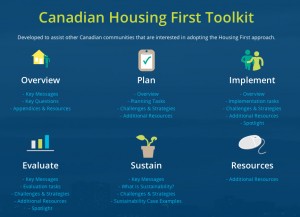 The Homeless Hub, together with the Mental Health Commission of Canada (MHCC) introduced the Canadian ‘Housing First’ Toolkit at the National Conference on Ending Homelessness in Vancouver. The toolkit was developed to help communities and organizations plan, implement, evaluate and sustain a Housing First initiative or approach in their local community. The toolkit is based on the experiences and research of the MHCC’s At Home/Chez Soi Project, which used a ‘Housing First’ approach effectively to reduce homelessness for individuals with mental illness.
The Homeless Hub, together with the Mental Health Commission of Canada (MHCC) introduced the Canadian ‘Housing First’ Toolkit at the National Conference on Ending Homelessness in Vancouver. The toolkit was developed to help communities and organizations plan, implement, evaluate and sustain a Housing First initiative or approach in their local community. The toolkit is based on the experiences and research of the MHCC’s At Home/Chez Soi Project, which used a ‘Housing First’ approach effectively to reduce homelessness for individuals with mental illness.
The project was conducted in multiple sites across Canada and was successful, in part, because of its multi-disciplinary approach that offered community leaders, agencies, front line workers, researchers and policy-makers information and tools to address homelessness. In addition to utilizing key learning’s from the project, this new tool has also been informed by consultations with stakeholder groups with experience planning Housing First programs.
This new resource can bring knowledge to housing service providers, planners, government policy-makers, researchers, and people with lived experience of homelessness and/or mental health. In addition, it has relevance to other segments of the homeless population. For example, youth or families, which may not be experiencing mental health challenges, can also benefit from a Housing First approach.
If you are wondering how Housing First differs from supportive housing approaches, here is some clarification. Housing First accommodates individuals immediately, without any preconditions using a harm reduction approach that does not demand maintenance of sobriety in order to maintain housing status. Housing and clinical services are separated. Participants are offered an array of health, mental health, and other support services after they are housed.
This differs from supportive housing approaches, or “continuum of care” models, which provide housing only in places with built-in clinical support services. This means that the landlord and service-provider functions are integrated in the same agency. Additionally, supportive housing approaches often mandate clients to achieve and maintain sobriety, in addition to receiving ongoing psychiatric services.
You can access the full toolkit on the Homeless Hub’s website.